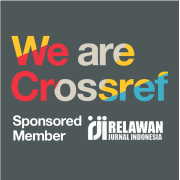HALAL APPROACH ON FOOD PRODUCT DESIGN IN THE VILLAGE LEVEL
Abstract
This research aims to determine the management model for halal products at the village level. The model used is the Tetrapreneur Mutual Cooperation Movement (G2R). The four approaches to this tetrapreneur are business chain, business market, business quality and business brand. The object of this research is the fried meatball products in Bejiharjo Village, Gunungkidul Regency, DI Yogyakarta. The method used is descriptive qualitative approach with in-depth interviews and literature study. The results of this study indicate that the development of food product designs at the village level can be carried out with the support of capital access, product innovation, consumer awareness, halal services, digital marketing and ancillary services.
Keywords
Full Text:
PDFReferences
Amalia, F.A., Sosianika, A. & Suhartanto, D. Indonesian Millennials’ Halal food purchasing: merely a habit? British Food Journal, 122(4)
Ardy, N. & Yulihasri. (2020). Strategi Pengembangan Atraksi Pengolahan Rendang (Marandang) Sebagai Daya Tarik Wisata Gastronomi di Kampung Rendang Kota Payakumbuh. Jurnal Ekonomi, 23(2), 134-154.
Edwards, J et al. 2011. Managing Marketing Teams. Journal of Business and Economics Research, Vol. 6 No. 1, p. 79-84
Jaiyeoba, H.B., Abdullah. M.A., & Dzuljastri, A.R. Halal certification mark, brand quality, and awareness. Journal of Islamic Marketing.
Kementerian Perekonomian. 2018.
Kementerian Koperasi dan Usaha Kecil Menengah. 2017.
Ogamba, IK. 2019. Millennials Empowerment : Youth Entrepreneurship for Sustainable Development. World Journal of Entrepreneurship, Management and Sustainable Development, Vol. 15 No. 3 : p. 267-278.
Ombi, N et al. 2018. The Effect of Business Development Services on Small Medium Enterprises (SMEs) Performance. International Journal of Academic Research in Business and Social Science, Vol. 8 No. 3 : p. 117-130
Rezai, G et al. 2011. Non-Muslim consumers’ understanding of Halal principles in Malaysia. Journal of Islamic Marketing, Vol. 3 No. 1, p. 35-46
Sanchez, A.V., & Moral, M. Halal Tourism: Literature Reviews and Experts’ View. Journal of Islamic Marketing, 11(3)
Suhartanto, D., Marwansyah, Muflih, M., Najib, M.F. & Faturohman, I. (2020). Loyalty Formation Toward Halal Food. British Food Journal, 122(1), 48-59
Rut, J and Wolczanski, T. 2016. Evaluation of The Production Process and The Company Startegic Position. Journal Marketing i Rynek, p. 745-756
Shah, SA et al. 2019. Halal Marketing: A Marketing Strategy Perspective. Journal of Islamic Marketing, p. 1-15
Thomson Reuters & Dinar Standard. 2019.
Tieman, M et al. 2012. Principles in Halal Supply Chain Management. Journal of Islamic Marketing, Vol. 3 No. 3, p. 217-243
Vincent, O et al. 2018. Production Planning and Organizational Effectiveness. Strategic Journal of Business and Social Science, Vol. 1, p. 1-28
Zailani, S et al. 2020. The influence of halal orientation Strategy on Financial Performance of Halal Food Firms. Journal of Islamic Marketing, Vol. 11, No. 1, p. 31-49
Zimon, D. 2017. The Impact of Quality Management System on Effectiveness of Food Supply Chains. TEM Journal, Vo. 6 No. 4 : hal. 693-698.
DOI: http://dx.doi.org/10.31958/imara.v6i1.5797
Refbacks
- There are currently no refbacks.
Copyright (c) 2022 Zilal Afwa Ajidin

This work is licensed under a Creative Commons Attribution-NonCommercial 4.0 International License.
INDEX BY:
Journal Imara distribute under a Creative Commons Attribution-NonCommercial 4.0 International License


















